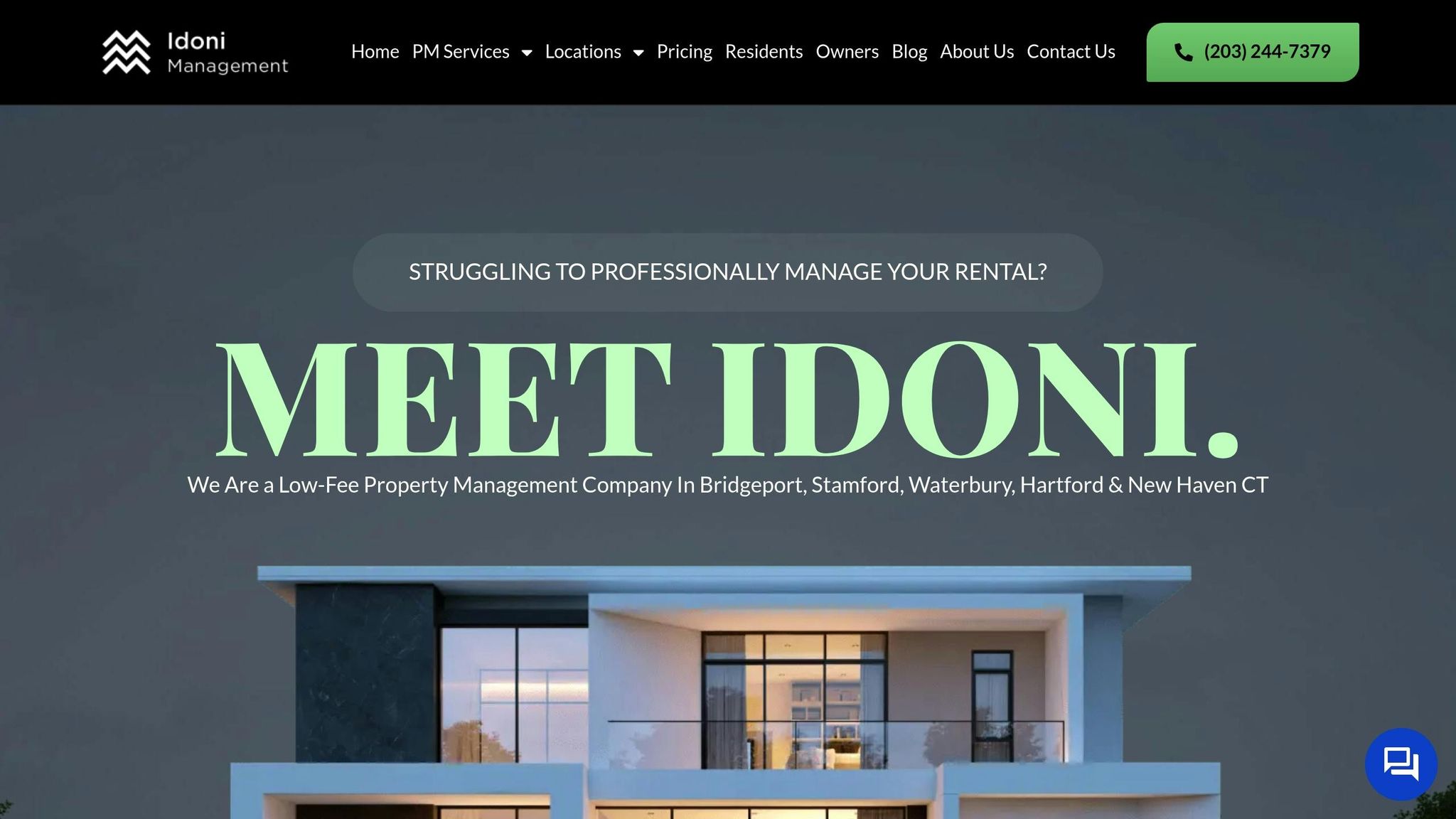Danbury Connecticut Property Management
Property management in Danbury, Connecticut, involves handling rental properties for owners, ensuring compliance with local and state laws, and maximizing rental income. Key responsibilities include tenant screening, rent collection, property maintenance, and legal adherence. Connecticut requires property managers to hold a real estate broker’s license, ensuring they understand the legal and business aspects of property management.
Key Highlights:
- Tenant Regulations: Security deposits are capped at two months’ rent (one month for tenants 62+), and landlords must return deposits within 30 days of lease termination.
- Local Rules: Danbury mandates a Certificate of Apartment Occupancy (CAO) for multi-unit properties when occupancy changes.
- Market Trends: Danbury’s rental market is competitive, with a 2.2% vacancy rate and steady rent growth (3.1% in early 2025).
- Demographics: Young adults (20–34) and seniors (65+) drive rental demand.
- Maintenance & Technology: Preventative maintenance and digital tools streamline operations, reduce vacancies, and improve tenant satisfaction.
For property owners, setting competitive rents, minimizing vacancies, and staying compliant with laws are critical for profitability. Companies like Idoni Management offer services such as tenant placement, rent collection, maintenance coordination, and legal support, helping landlords manage properties efficiently.
The Bite-Sized Guide to Mastering Property Management
Understanding the Danbury Rental Market
Danbury’s rental market mirrors broader trends in Connecticut while also reflecting its own unique characteristics. The Connecticut Property Owners Association (CTPOA) notes that "Connecticut’s rental market remains characterized by tight supply and strong demand, though we are seeing some subtle shifts". This backdrop provides valuable context for exploring strategies to maximize rental income and efficiently manage properties in Danbury.
Key Characteristics of the Danbury Rental Market
The data paints a picture of a highly competitive rental landscape. For instance, Connecticut’s residential vacancy rate for new leases was about 2.2% in early 2025 – signaling a tight market. Meanwhile, rent growth across the state has remained steady, with new leases seeing approximately 3.1% growth in the first quarter of 2025. Locally, Danbury’s rental market is classified as "WARM", reflecting a rise in renter demand compared to national averages.
Demographics are a significant driver of this demand. Two key groups – young adults aged 20–34 and seniors aged 65 and older – are fueling the need for rental properties. This diverse tenant pool brings with it a wide range of preferences and requirements, adding complexity to property management in the area.
Supply constraints further intensify competition. A projected 20% national decline in completed apartment projects, coupled with rising borrowing costs, has limited new construction. According to the CTPOA, "with fewer new apartments being built and a persistent housing shortage, demand continues to outstrip supply, keeping the market competitive for renters". Additionally, higher interest rates have made financing new developments more expensive, further reducing the pace of new apartment construction. These challenges highlight the importance of strategic property management tailored to Danbury’s market.
Why Local Knowledge Matters in Property Management
In a market like Danbury, local expertise is crucial. The city’s strong rental demand requires pricing strategies that strike the right balance between being competitive and ensuring profitability. Additionally, navigating local regulations can be complex, and property managers with a deep understanding of these rules can help owners avoid costly compliance issues.
The demographic mix in Danbury also shapes property management strategies. For example, catering to young professionals often involves different amenities and marketing approaches than managing properties for senior tenants. Local insights into employment trends, transportation options, and lifestyle preferences can guide decisions about lease terms, property features, and marketing efforts. Understanding seasonal rental patterns and cycles of demand is equally important for reducing vacancy rates and optimizing rental income.
Maximizing Rental Income for Danbury Property Owners
With Danbury’s rental market being as competitive as it is, property owners have a real chance to boost their income – if they approach it thoughtfully. The key is finding a balance between keeping tenants happy and ensuring profitability. Here’s how property owners can make the most of their investments.
Setting Competitive Rental Prices
In a market like Danbury, pricing your rental competitively is a must. Start by doing your homework: look at similar properties in the area and compare factors like size, location, amenities, and parking availability. This research will give you a solid foundation for setting a fair price.
But don’t just set it and forget it. Rental prices should be reviewed regularly to stay in line with market trends and seasonal demand. For instance, summer often sees higher activity, which might allow for slight price adjustments.
Want to charge a premium? Offer upgrades that tenants value. Features like in-unit laundry, modern kitchens, energy-efficient air conditioning, or pet-friendly policies can justify higher rents – especially if these perks are highlighted in your marketing. Speaking of marketing, don’t skimp on high-quality visuals. Professional photos and virtual tours can make your property stand out and reduce the time it sits vacant.
Reducing Vacancy Rates
Vacancies are income killers, so minimizing them should be a top priority. Start by initiating lease renewal discussions early – well before the current lease ends. Small updates like fresh paint or modern fixtures can also make a big difference in tenant retention.
Flexibility in lease terms is another way to appeal to a broader range of renters. For example, young professionals might prefer short-term leases, while families often look for longer commitments that offer stability. You can even include gradual rent adjustments in long-term agreements to keep everyone happy.
Timing matters, too. Rental activity in Danbury tends to peak during the summer, so plan your pricing and marketing strategies around this period to maintain consistent occupancy.
Rent Collection Best Practices
Getting rent on time is crucial for maintaining cash flow, and automated payment systems can make this process much smoother. Online platforms are not only convenient but also reduce the chances of late payments.
Clear communication is key. From the start, outline your payment policies – due dates, acceptable payment methods, and any late fee structures. This transparency helps avoid confusion and sets expectations for tenants.
If payment delays do occur, address them promptly. Some property owners have found success with incentive programs, like small discounts for tenants who consistently pay on time. These programs can build goodwill and encourage reliability.
Don’t forget to document everything. Keeping detailed records of all transactions, including partial payments, ensures you’re compliant with state regulations and helps with financial planning.
In cases where tenants face temporary financial hardships, offering emergency payment plans can be a smart move. These plans can help responsible tenants get back on track without resorting to costly eviction processes, ultimately benefiting both parties.
Streamlining Tenant Management and Property Maintenance
Managing tenants and keeping properties in good condition can make a huge difference in your success as a property owner in Danbury. Having the right systems in place not only keeps tenants happy but also protects your investment. Here’s how you can keep everything running smoothly.
Tenant Screening and Leasing Processes
A thorough tenant screening process can help reduce turnover and ensure you find reliable renters. Start with a detailed application that checks employment, credit history, and references from previous landlords. Make sure your lease agreements comply with Connecticut laws, clearly outlining key details like rent amounts, due dates, maintenance responsibilities, and rules on pets, smoking, and guests.
When reaching out to previous landlords, ask specific questions about payment history, property care, and any lease violations. This can give you a clearer picture of the applicant’s reliability.
To avoid disputes over security deposits, conduct thorough move-in and move-out inspections. Use a standardized checklist and document the property’s condition with photos, covering everything from appliances to flooring and walls. Sharing these reports with tenants ensures transparency and sets the tone for a fair process.
A solid screening process also lays the groundwork for proactive maintenance, as reliable tenants are more likely to report issues promptly.
Effective Maintenance Coordination
Preventative maintenance is key to saving money and keeping tenants satisfied. Create a seasonal maintenance schedule to handle tasks like HVAC servicing, gutter cleaning, and exterior inspections. Regular upkeep minimizes costly repairs and keeps your property in top shape.
Schedule property inspections every six months to catch small problems before they become big ones. During these checks, look for signs of water damage, pest issues, or unauthorized changes to the property, and address them quickly.
Having a dependable network of local vendors is essential. Build relationships with trusted contractors, plumbers, electricians, and HVAC technicians before you need them. For larger projects, get multiple quotes and verify that vendors are licensed and insured.
Keep detailed records of all maintenance work, including dates, costs, and vendor details. This helps with budgeting and can reveal recurring issues that may signal deeper problems.
Be prepared for emergencies by establishing clear response protocols and sharing them with tenants. Quick action on issues like heating failures, major leaks, or electrical problems is crucial for maintaining a livable property – and staying compliant with legal requirements. Providing tenants with 24/7 contact information for emergency repairs can make all the difference.
Lastly, set an annual maintenance budget. A good rule of thumb is to allocate 1–3% of the property’s value each year for repairs and upkeep, adjusting for older properties as needed.
Using Technology for Tenant Management
Technology can simplify many aspects of tenant management. Digital platforms make it easier to communicate with tenants, track maintenance requests, and keep policies up to date.
Online maintenance request systems allow tenants to submit detailed work orders, reducing miscommunication and speeding up repairs. This ensures safety issues are addressed quickly and efficiently.
Tenant and owner portals centralize important information. Tenants can access lease agreements, submit maintenance requests, and track payment histories, while you can monitor property performance and expenses anytime.
Automated rent collection platforms are another game changer. They send timely reminders, reduce late payments, and automatically apply late fees as outlined in the lease. It’s a simple way to keep cash flow steady.
Finally, maintaining digital records – like lease agreements, inspection reports, maintenance logs, and financial documents – makes life easier when it comes to tax preparation and staying organized. Consider using software that schedules routine tasks and sends reminders for seasonal maintenance, helping you avoid oversights that could lead to tenant complaints or property damage.
sbb-itb-66a7c69
Staying Compliant with Danbury and Connecticut Regulations
Managing property in Danbury requires careful attention to both state and local laws. Connecticut has a reputation for being tenant-friendly, which means compliance isn’t just a suggestion – it’s a necessity for protecting your investment and maintaining positive tenant relationships. Below, we’ll break down the key regulations you need to know and how to manage your property effectively to stay on the right side of the law.
Overview of Key Regulations
Fair Housing Laws
Connecticut’s fair housing laws are designed to ensure equal treatment for all tenants. Discrimination based on race, color, religion, sex, national origin, familial status, disability, age, marital status, sexual orientation, gender identity, or lawful source of income is strictly prohibited.
Security Deposit Rules
If you’re collecting a security deposit, it must be held in a Connecticut bank escrow account. You’re also required to notify tenants of the account details within 30 days. When the lease ends, landlords must return the deposit or provide an itemized list of deductions promptly.
Eviction Requirements
Evictions in Connecticut must follow specific procedures. For non-payment or lease violations, landlords are required to give proper notice. For month-to-month tenants, written notice must be delivered either in person or via certified mail within the appropriate timeframe.
Habitability Standards
Landlords are responsible for ensuring their properties meet basic health and safety standards. This includes maintaining functional heating, plumbing, and electrical systems. If serious issues arise and remain unresolved, tenants have the right to pursue remedies.
Lead Paint Disclosures
For properties built before 1978, landlords must comply with federal lead disclosure laws. This includes providing tenants with EPA-approved information about lead hazards and disclosing any known risks related to lead-based paint.
Maintaining Compliance Through Active Management
Knowing the regulations is just the beginning. Staying compliant requires active, hands-on management. Beyond meeting legal obligations, proactive management builds tenant trust and helps preserve property value.
Keep Detailed Records
Maintain thorough digital records of tenant communications, lease agreements, maintenance requests, and inspection reports. This documentation can be invaluable if disputes arise.
Conduct Routine Inspections
Schedule regular property inspections to check on essential systems like heating and smoke detectors. Address any issues quickly and document the repairs to show compliance with habitability standards.
Stay Informed on Law Updates
Laws can change, so it’s crucial to stay updated on Connecticut’s landlord-tenant regulations. Keep an eye on updates from the Connecticut Department of Housing and consult legal professionals when needed.
Follow Proper Notice Procedures
When notifying tenants about lease changes, rent increases, or property entry, use standardized forms and reliable delivery methods like certified mail to ensure compliance.
Handle Finances Correctly
Follow lease terms when managing rent payments and late fees. Maintain separate accounting records for transparency and accurate financial reporting.
Be Prepared for Emergencies
Have a clear plan in place for urgent repairs and maintain a list of contractors who are available 24/7 to handle emergencies.
Collaborating with local housing authorities, legal aid groups, and other property owners can also be a great way to stay informed and share best practices. Open communication and a willingness to learn from others can help you navigate the complexities of property management in Danbury while avoiding potential pitfalls.
How Idoni Management Supports Danbury Property Owners

Idoni Management steps in to ease the challenges of property ownership in Danbury by offering tailored solutions that address everything from tenant placement to legal compliance. Their services are designed to simplify property management while ensuring that owners maximize their investment potential.
Complete Service Offerings
Idoni Management takes care of every stage of property management, starting with tenant placement. They conduct thorough tenant screenings, including background checks, credit evaluations, and income verification, to ensure reliable renters for your property. Additionally, the service includes market analysis to set competitive rental rates and professional-quality photos to attract the right applicants.
Rent collection is handled seamlessly through an automated system, ensuring consistent cash flow and eliminating the hassle of tracking down late payments. Property owners also benefit from detailed financial reporting and a user-friendly online portal, where they can monitor income, expenses, and overall property performance in real-time.
Maintenance is another area where Idoni Management excels. They work with trusted local contractors who are well-versed in Danbury’s specific requirements. Whether it’s routine upkeep or emergency repairs, their 24/7 emergency line ensures urgent issues are resolved without delay. Regular property inspections are also conducted to catch potential problems early, saving owners from costly repairs down the line.
Should an eviction become necessary, Idoni Management handles the entire legal process in compliance with Connecticut regulations. This service helps property owners avoid the pitfalls of legal errors that could delay proceedings or increase costs.
Special Benefits for Danbury Property Owners
Danbury property owners working with Idoni Management gain access to unique benefits designed to enhance their experience. Weekly property performance reports provide detailed insights into rental income, maintenance expenses, and local market trends. These updates empower owners to make informed decisions and stay ahead of market shifts.
All services are integrated into an online portal that streamlines operations. The portal supports multiple payment methods and automatically processes late fees according to lease terms and Connecticut law.
Another standout feature is the 12-month tenant guarantee. If a tenant vacates within the first year, Idoni Management will replace them at no additional cost. This assurance underscores their commitment to finding dependable, long-term tenants.
Property owners also benefit from the company’s network of local contractors and service providers. These professionals are familiar with Danbury’s building codes and regulations, ensuring that all maintenance and repair work is completed efficiently and in compliance with local standards.
Pricing and Plan Options
Idoni Management offers three service plans to suit the varying needs of property owners:
| Plan Name | Price | Key Features | Best For |
|---|---|---|---|
| Lease Only | 1 Month’s Rent | Market analysis, professional photos, tenant screening, lease drafting | Owners who prefer to self-manage after tenant placement |
| Full Management | 10% Monthly Rent | All lease services plus rent collection, inspections, maintenance coordination, 24/7 emergency line | Owners seeking a hands-off, comprehensive solution |
| With Eviction | 15% Monthly Rent | Full management services plus eviction handling and damage protection | Owners with higher-risk or premium properties |
The Lease Only plan is ideal for experienced owners who want help finding tenants but prefer to manage the property themselves. The Full Management plan offers an all-inclusive approach, covering everything from rent collection to emergency maintenance, with pricing tied to the property’s rental performance. For owners of premium or higher-risk properties, the With Eviction plan adds eviction handling and damage protection for added peace of mind. This plan is available for properties with monthly rents above $1,000.
All plans include access to the owner portal, transparent financial reporting, and the flexibility to adjust services as needed. Whether you’re managing one property or an expanding portfolio, Idoni Management ensures you have the tools and support to succeed.
Keys to Successful Property Management in Danbury
Managing property successfully in Danbury comes down to four key elements that separate thriving investments from those that fall short. When handled with care and foresight, these elements pave the way for steady rental income and satisfied tenants.
The first cornerstone is local expertise, which relies on staying up-to-date with market conditions and regulatory changes. Understanding Connecticut’s landlord-tenant laws and maintaining good relationships with local code enforcement officials can prevent legal headaches and keep operations running smoothly. Knowledge of the local market also helps property owners make informed decisions about pricing, tenant needs, and property improvements.
Next, routine maintenance and inspections are critical. Scheduling quarterly property checks and addressing repairs promptly – whether it’s fixing wear and tear, upgrading amenities, or handling pest control – protects property value and appeals to reliable tenants. These proactive measures not only prevent costly emergency repairs but also ensure the property remains attractive and functional, which helps retain quality tenants.
Effective tenant management is another pillar of success. This includes thorough tenant screening, setting competitive rent prices, and streamlining rent collection processes. Clear and fair lease agreements also help minimize disputes and administrative issues, contributing to stable occupancy rates and smooth operations.
Lastly, operational efficiency is a game-changer. Leveraging digital tools for tasks like rent collection, maintenance tracking, and financial reporting simplifies management and enhances transparency. These tools reduce administrative burdens while ensuring a professional and consistent experience for tenants.
The most successful property owners in Danbury don’t stop at these tactical steps – they think long-term. They align their management practices with their broader investment goals, whether that’s generating steady rental income or increasing property value over time. By focusing on creating value for tenants and using proven systems to optimize operations, they unlock their property’s full potential.
In contrast, those who take a more casual, unstructured approach often struggle to achieve the same level of success. A professional, strategic mindset is what sets high-performing property managers apart, ensuring their properties thrive for years to come.
FAQs
What licenses are required for property managers in Danbury, Connecticut, and how do they affect property management services?
In Danbury, Connecticut, anyone managing properties must possess a real estate broker license. To earn this license, individuals need to complete more than 100 hours of coursework and successfully pass a state licensing exam.
This requirement ensures that property managers are well-versed in local laws and regulations, helping them stay aligned with state standards. For property owners, it means partnering with licensed experts who can deliver dependable management services while safeguarding their investments.
What are the best ways for property owners in Danbury to use technology to improve tenant satisfaction and simplify property management?
Property owners in Danbury can improve tenant satisfaction and simplify their daily operations by leveraging property management software. These tools take the hassle out of essential tasks like rent collection, handling maintenance requests, and staying on top of tenant communication. The result? Less time spent on manual work, fewer mistakes, and a smoother experience for tenants.
On top of that, digital solutions for package management and virtual support services can add another layer of convenience. Features such as 24/7 support and real-time updates not only make tenants feel appreciated but also help property owners stay organized and lighten their workload.
How can property owners in Danbury, CT, set rental prices that attract tenants while maximizing income?
To strike the right balance between competitive pricing and maximizing rental income, property owners in Danbury can turn to dynamic pricing strategies. These strategies adjust rental rates based on factors like demand, local competition, and seasonal trends. The result? Rental rates that appeal to tenants while still boosting profitability.
Keeping an eye on local rental market trends and comparing your property to similar ones in the area can help you determine a fair and competitive price. A helpful guideline to consider is the 1% rule – this suggests setting monthly rent at roughly 1% of the property’s value. On top of that, regularly reviewing and adjusting your rental rates as market conditions change can help minimize vacancies and ensure a steady income stream.




